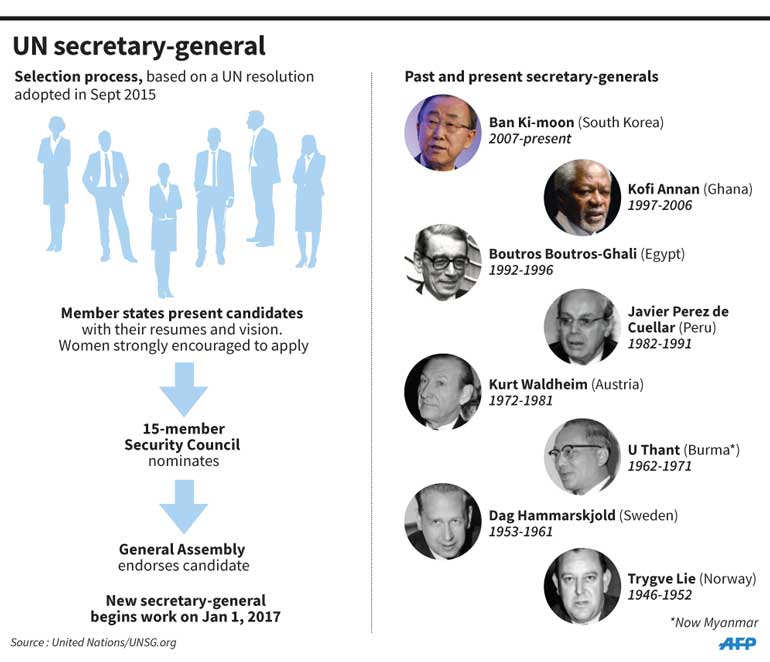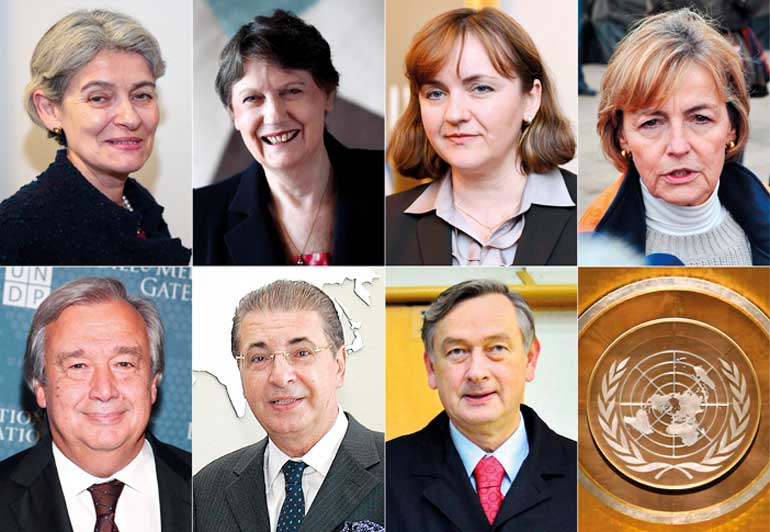Sunday Feb 22, 2026
Sunday Feb 22, 2026
Wednesday, 13 April 2016 00:00 - - {{hitsCtrl.values.hits}}
 AFP: For the first time in the United Nations’ 70-year history, candidates vying to become secretary-general will make their pitch for the job to world governments in hearings this week.
AFP: For the first time in the United Nations’ 70-year history, candidates vying to become secretary-general will make their pitch for the job to world governments in hearings this week.
The four men and four women campaigning to become the world’s top diplomat will each go before the General Assembly for two hours to lay out their vision and answer questions from member-states and civil society. The unprecedented hearings are part of a broader push for more transparency in the selection of who will succeed Ban Ki-moon on 1 January 2017. “We have decided collectively to open up the race,” French Ambassador Francois Delattre said of the new selection process. The hearings “are important and new, and I do plan to attend to listen to each of the candidates,” he told AFP.
For decades, the selection of the UN chief has been the purview of the five permanent Security Council members – Britain, France, China, Russia and the United States – in a process kept mostly behind closed doors.
But the General Assembly in September voted to lift some of the secrecy surrounding the process, asking candidates to send a formal letter of application, present their resumes and appear at hearings. Among the declared candidates are UNESCO chief Irina Bokova of Bulgaria, former New Zealand prime minister and head of the UN Development Programme Helen Clark, and former high commissioner for refugees Antonio Guterres of Portugal.
Continued on Page 9
Time to shine
With little time left before the Security Council begins a series of straw polls to pick a nominee, diplomats say the race remains wide open.
The selection process will begin in July and several rounds of polling will take place until September, when the 15-member council will submit one nominee to the General Assembly, which is expected to endorse the choice.
British Ambassador Matthew Rycroft said the hearings are shaping up as a first test for the candidates.
“If they don’t have a compelling vision, or they aren’t able to communicate effectively or aren’t able to demonstrate their leadership and other credentials, then it will make it harder for Security Council members to encourage them,” Rycroft said.
A Security Council diplomat, who asked not to be named, said “there could be some surprises.”
“It’s a bit like TV election debates. You could have someone who suddenly shines, or someone who goes in strong but then crashes,” he said.
Russian Ambassador Vitaly Churkin said the candidates’ showing could have an impact on the Security Council’s choice this time around.
“For us, it’s important that the next secretary-general enjoy the broadest possible support from members of the United Nations,” Churkin said.
Time for a woman
Security Council members are facing calls to pick the first woman after eight men in the job, and to give preference to a candidate from Eastern Europe, the only region that has yet to be represented in the top post.
Russia has said that the next UN chief should come from that region and six eastern European countries have put forward candidates.
Aside from Bokova, they are former Slovenian president Danilo Turk, former foreign ministers Vesna Pusic of Croatia, Natalia Gherman of Moldova, Srgjan Kerim of Macedonia and Montenegro’s Foreign Minister Igor Luksic.
More candidates are expected to come forward, including two women who could shake up the race -- EU Commissioner Kristalina Georgieva of Bulgaria and Argentina’s Foreign Minister Susana Malcorra.
A total of 56 countries, including Japan and Germany, have signed up to an initiative led by Colombia calling for serious consideration to be given to female candidates.
Of the P5 powers, only Britain has said it is time for a woman to lead the United Nations. The other four have all demurred, saying only that they will back “the best person” for the job.
The search for Ban’s successor comes at a time of high anxiety in global affairs as the United Nations grapples with the biggest refugee crisis since World War II and raging conflicts in the Middle East and Africa.
A wave of allegations of sexual abuse by UN peacekeepers has dealt a damaging blow to the world body’s prestige.
The choice of a forward-thinking, eloquent and energetic secretary-general could help improve the UN’s standing, with one diplomat saying “we need more of a general than a secretary.”

This combination of file pictures created on 10 April 2016 shows candidates for the upcoming UN Secretary-General election (from top left) Unesco Director General Irina Bokova, United Nations Development Programme (UNDP) Head Helen Clark, Moldova’s Foreign Minister Natalia Gherman, Croatian Foreign Minister Vesna Pusic, former Portuguese Prime Minister and former UN High Commissioner for Refugees Antonio Guterres, Macedonia’s former Foreign Minister and Srgjan Kerim, Slovenian former President Danilo Turk and the United Nation emblem. An ex-president, three former prime ministers, several ex-foreign ministers and even a part-time poet are all campaigning to become the next UN secretary-general. The election later this year may see the first secretary-general hailing from Eastern Europe and possibly the first woman in the top post – AFP
AFP: An ex-president, three former prime ministers, several ex-foreign ministers and even a part-time poet are all campaigning to become the next UN secretary-general.
The election later this year may see the first secretary-general hailing from eastern Europe and possibly the first woman in the top post.
Here’s a look at the eight declared candidates so far:
Irina Bokova: The head of the UN cultural agency UNESCO since 2009, Bokova briefly served as Bulgaria’s foreign minister from 1996 to 1997 and was also ambassador to France and to Monaco. Considered a strong candidate from eastern Europe, the 63-year-old Bokova is also seen as pro-Russian. Her father was editor of the Bulgarian communist party newspaper during the Soviet era. Her handling of the Palestinian membership in UNESCO in 2011, which led to a cutoff of US funding, ruffled feathers. Bokova speaks English, French, Russian and Spanish.
Helen Clark: The former prime minister of New Zealand has led the UN Development Programme since 2009, making her the highest-ranking woman at the United Nations. The 66-year-old former academic is among New Zealand’s longest-serving prime ministers, having led the government for three successive terms from 1999 to 2008. Clark’s chances remain unclear, with some diplomats describing her as a “pro-Western” candidate who lacks broad support in the UN’s global diplomatic community.
Natalia Gherman: The former foreign minister of Moldova led her country’s negotiations with the European Union on association and trade. Gherman held the post from 2013 until January this year. The 47-year-old diplomat also served as Moldova’s ambassador to Austria and to Sweden, Norway and Finland. The daughter of independent Moldova’s first president, Mircea Snegur, Gherman speaks English, Russian and German.
Continued on Page 9
Antonio Guterres: The former UN high commissioner for refugees is seen as a strong contender for his handling of Europe’s refugee crisis. He was at the helm of UNHCR for 10 years until December 2015, tackling one of the most challenging jobs at the United Nations. The 66-year-old socialist served as prime minister of Portugal from 1995 to 2002. A trained engineer, Guterres is fluent in English, French and Spanish.
Srgjan Kerim: Macedonia’s former foreign minister was also the Balkan country’s ambassador to the United Nations and served as president of the UN General Assembly in 2007 and 2008. Later, he held the post of UN envoy for climate change. While he was the first candidate to put forward his name in the race, the 67-year-old is not seen as a heavyweight contender. Kerim speaks nine languages including English, French, German, Spanish and Italian.
Igor Luksic: Montenegro’s foreign minister since 2012, Luksic also served as prime minister and finance minister. At age 39, he is the youngest contender in the race to be secretary-general. He has published three books of poetry and prose including “The Book of Fear,” translated into Italian and French. Fluent in English, Luksic also speaks Italian, French and German.
Vesna Pusic: As foreign minister, a post she held for five years until January, the 62-year-old Croatian oversaw her country’s entry into the European Union in 2013. A sociologist, Pusic has been outspoken about gender equality and LGBT rights. She is fluent in English and German.
Danilo Turk: Slovenia’s former president was also the country’s first UN ambassador in 1992. After his posting as Ljubljana’s envoy, he was appointed UN assistant secretary-general for political affairs, a post he held until 2005 before returning to Slovenia, where he taught law. Returning to politics, he was elected president in 2007 and held the post until 2012, when he went back to teaching law studies. He is considered one of the most experienced candidates. Speaks French, English, German and Serbo-Croat.